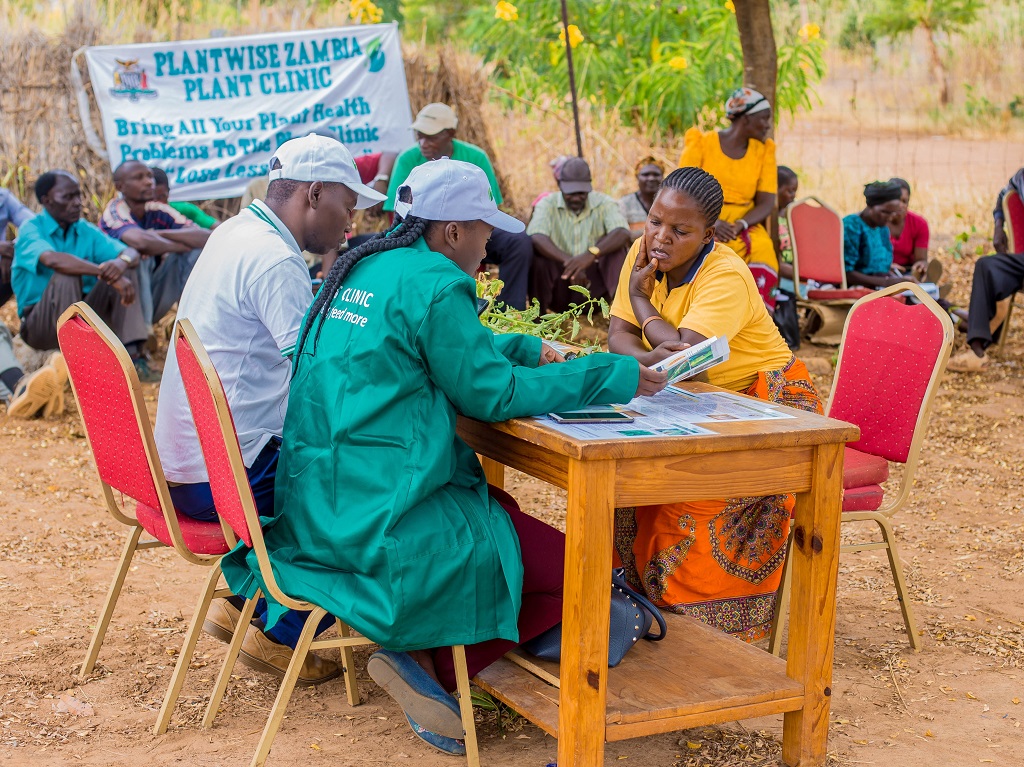About
Satellite observations
Weather data
Pest modelling
Innovation can provide new solutions. PRISE helps to improve the livelihoods of smallholder farmers by reducing crop losses caused by pests across four sub-Saharan African countries.
Data from a variety of sources – satellite observations, weather data, geographic data, and details about the spread and biology of pests – are combined in a data cube to run algorithms, which ultimately produce pest risk forecasts. These are used to give farmers timely alerts and advice to help manage local pest outbreaks.
PRISE models risk to crop health from insect pests and plant diseases based on environmental data. Tailored messages are used to provide a risk assessment to growers in particular regions. Advice and support is offered by the Plantwise network and other agricultural extension services, and subscribers are prompted to provide crowdsourced feedback, which is used to validate the model. This feedback loop provides greater confidence in the forecasts.

PRISE Project Partners
PRISE is delivered by a consortium of UK and international partners. The UK partners (the PRISE project team) comprises of:
CABI is an international not-for-profit organization with a mission to improve people’s lives by providing information and applying scientific expertise to solve problems in agriculture and the environment. Through knowledge sharing and science, CABI helps address issues of global concern, such as safeguarding the environment and improving global food security. It does this by helping farmers grow more and lose less of what they produce, combating threats to agriculture and the environment from pests and diseases, protecting biodiversity from invasive species, and improving access to agricultural and environmental scientific knowledge. CABI’s 49 member countries guide and influence the core areas of work. CABI has regional centres worldwide, with offices in Kenya, Ghana and Zambia and many international programmes throughout sub-Saharan Africa.
Assimila Limited is an independent UK consultancy company working with scientific, government and commercial clients seeking to understand, monitor and predict the environment. The company was formed in 2006 and maintains a close association with the research sector, to help pull through the latest research results into operational and commercial exploitation and to help the research sector to appreciate the requirements and constraints of government and commercial organisations. Assimila’s focus in EO applications is on agriculture, specifically crop performance and crop health.
King’s College London (KCL) is a research-intensive university, committed to maintaining the highest standards in research and education. It is ranked one of the top 25 universities in the world (2016-17 QS international world rankings). King’s Department of Geography has a long-established international reputation as a centre of research excellence, and with over 50 academic and research staff and one of the largest Geography graduate schools in the UK (approximately 175 master’s students and over 100 PhD students) is one of the largest in the UK. It is part of King’s School of Global Affairs, staff in the Department have won many international and national awards for their work.
RAL Space is one of seven operational departments located at the Rutherford Appleton Laboratory (RAL) undertaking world-leading research and technology development. CEDA, the Centre for Environmental Data Archival at STFC is funded via the UK Natural Environment Research Council to operate the British Atmospheric Data Centre and the NERC Earth Observation Data Centre.
International partners are key players who help with the strategic direction, implementation and scale-up of PRISE. They inform PRISE in this way via at least annual stakeholder workshops, where their local knowledge of the political, environmental and socio-economic context prove invaluable to implementing PRISE. Through this engagement, PRISE is able to be successfully integrated into the existing national agricultural services, one step on the pathway to sustainability.
Supported by

![]()
Partners
Assimila
CABI
King’s College London
Centre for Environmental Data Analysis
Plant Protection and Regulatory Services Directorate (Ghana)
Kenya Agricultural and Livestock Research Organization
Ministry of Agriculture, Livestock & Fisheries (Kenya)
Zambia Agriculture Research Institute
Department for Agricultural Extension Services (Malawi)
Sitemap
Contact
PRISE
Nosworthy Way
Wallingford
OX10 8DE
